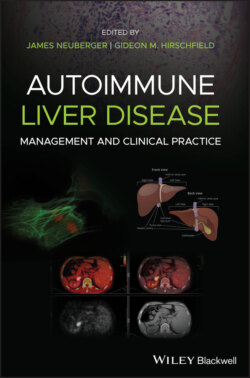Читать книгу Autoimmune Liver Disease - Группа авторов - Страница 62
Non‐HLA Gene Associations
ОглавлениеInterpreting the risks for autoimmune diseases conferred by non‐HLA genes is problematic because the odds ratios for risk of autoimmune diseases are far lower than those for HLA alleles [15]. Polymorphisms in genes encoding CTLA‐4, TNF‐α, Fas (CD95), TNF‐induced protein 3 (TNFAIP3), macrophage migration inhibitory factor (MIF), and SH2B adapter protein 3 (SH2B3) have been implicated in susceptibility to autoimmune diseases, including AILDs. CTLA‐4 is critical for downregulating effector immune responses and producing T‐cell senescence. TNF‐α is a potent proinflammatory effector cytokine and therapeutic target in specific autoimmune diseases. Dysfunction of genetic variants or deficient levels of TNFα‐induced protein 3‐interacting protein 1 (TNIP1) predispose normal innate cells to produce abnormal inflammatory responses to innocuous TLR ligands. TNFAIP3 is a modifying enzyme for ubiquitin, which may influence antigenicity of self‐proteins. CD95 (Fas) and CD95L (FasL) variants promote survival of autoreactive T and B cells and modify apoptosis of target cells. MIF is a proinflammatory cytokine in both innate and adaptive immunity. SH2B3 suppresses cytokine‐induced inflammation by downregulating Janus kinases (JAKs) and receptor tyrosine kinases (RTKs). Several autoimmune diseases also are linked to SNPs in cytokine and cytokine receptor genes. A pertinent example is the IL23R gene, which encodes a protein that forms a dimer with IL‐12Rβ1 to create the IL‐23 receptor complex required for IL‐23 induction of proinflammatory Th17 cells.
